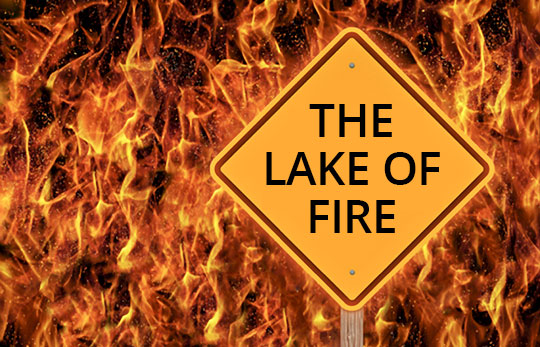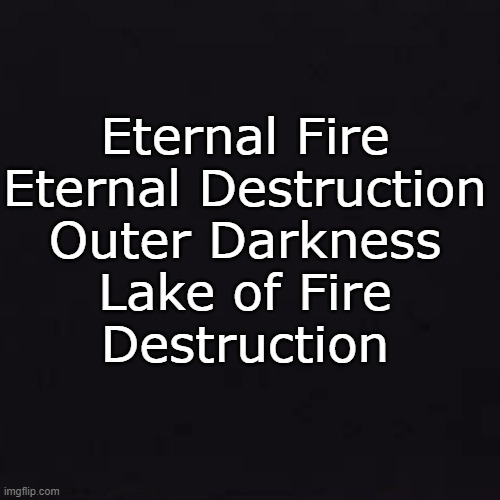Other Words used for Hell
Other Words of “Hell”
Countless traditionalists depend strongly upon the words of hell present in the NT, such as Gehenna, Hades, and Tartarus. They may also point to other words and/or phrases they assume illustrates hell, such as “eternal fire and eternal punishment” (Matt 3:12, 25:41-46), “outer darkness” (Matt 8:12), “Lake of Fire” (Rev 20:10), and “destruction” (2 Thess. 1:9, Matt 7:13-14). Though there are additional passages with distinct language that may also suggest hell, contingent upon one’s personal view of the fate of the wicked, those aforementioned words are generally the more commonly referenced words next to Gehenna, Hades, and Tartarus that most would pertain to the doctrine of hell. Therefore, this blog post will discuss those words and demonstrate that they may not instinctively connect to hell but to something else that is bound contextually with the Gospel writers.
Social Setting
Notre Dame Professor and New Testament Scholar Jerome Neyrey asserts in his book The Social World of Luke-Acts, “The fact that many Americans read Luke-Acts and claim to understand what the author means is interesting to say the least.” Though he is referring to Luke-Acts specifically, he likewise writes in the introduction to this book that the social setting of Luke-Acts is equivalent across all NT canonical sources because that social setting is identical to other first-century works. Note, however, how many verses mentioned above in the introduction are from the Gospel of Matthew. That is because the Gospel writers each have a unique social context from which they were writing. Therefore, to properly understand and interpret the Gospels, an appropriate comprehension of societal context needs to be understood.
How to Read the Gospels
Neyrey also states in his book, “It is one thing, however, to collect data, and quite another to interpret those data.” Simply because modern Americans can read the Gospels in English, and their perceived understanding appears to fit that context does not mean it is indeed the correct interpretation. This concept applies not only to the subject of hell but many other subjects where there may be disputes among Christians as to what a specific passage entails. Though this post will merely focus on the doctrine of hell, the models under discussion are helpful for countless other doctrines and theological disciplines.
When contemporary individuals read the Gospels, they tend to read them by default from their own perspective. Without proper understanding on how to read ancient texts, many may easily perceive the “world” of the Gospels as if it were their own social system, known as ethnocentrism. Ethnocentrism asserts that all people, in all parts of the world, and at all times, think just like “I” do. Simply because the Gospels appear to allude to something that makes sense for us today does not imply that that is precisely what it intended two thousand years ago. This methodology is valid for all biblical texts but pertains primarily to the Gospels, given that the context of first-century Judaism permeates every facet of those writings. Therefore, a proper understanding of the words and/or phrases the biblical authors use to indicate “hell,” might actually mean something entirely different.
Eternal Fire/Punishment
One of, if not the most familiar passage that seemingly suggests hell that does not use one of the “hell words” is in Matthew 25:41-46:
41 “Then he will say to those on his left, ‘Depart from me, you who are cursed, into the eternal fire prepared for the devil and his angels. 42 For I was hungry and you gave me nothing to eat, I was thirsty and you gave me nothing to drink, 43 I was a stranger and you did not invite me in, I needed clothes and you did not clothe me, I was sick and in prison and you did not look after me.’
44 “They also will answer, ‘Lord, when did we see you hungry or thirsty or a stranger or needing clothes or sick or in prison, and did not help you?’
45 “He will reply, ‘Truly I tell you, whatever you did not do for one of the least of these, you did not do for me.’
46 “Then they will go away to eternal punishment, but the righteous to eternal life.”

This passage encompasses two primary phrases that appear to refer to hell—“eternal fire” and “eternal punishment.” The first, “eternal fire,” generally causes an individual to imagine hell because the two words “eternal” and “fire” are combined. However, as Edward Fudge correctly illustrates in his book The Fire that Consumes, the adjective “eternal” modifies the noun “fire” and not the element cast into the fire. Therefore, just because Jesus throws something into the eternal fire does not mean that entity will remain eternal within the fire itself.
Eternal in the Fire?
For example, presume I am God, and I love S’mores so much that I intend to eat them for eternity. First, I begin by constructing an eternal fire since I plan on using it so much. Then, when I make my first S’mores, I inadvertently drop the marshmallow in the mud and choose to use a different one. I subsequently hurl the first marshmallow into the fire. What becomes of the marshmallow? Does it remain in the fire forever? No, it gets consumed and burned up. The fire remains unaffected, but the item thrown into it is now transformed into ashes.
Suppose that a million years later, I choose to make another S’mores in the identical fire that is not extinguished since it is eternal. This time, I drop the chocolate in the mud and decide to throw that into the fire and use a brand new piece of chocolate. What happens to the chocolate after being thrown into the fire? It melts and is subsequently consumed, never to exist again. Does the chocolate remain for eternity? What about the marshmallow from a million years ago? Does it still remain in the eternal fire? I realize this may appear like a ridiculous comparison, but it does allude to the fact that the fire is what is eternal and not the item cast into the fire.
God as Fire
Likewise, the expression “eternal fire” also has concepts familiar with God as fire in the OT. For example, Exodus 13:21 states, “The Lord was going before them in a pillar of cloud by day to lead them on the way, and in a pillar of fire by night to give them light, that they might travel by day and by night.” Again, in Exodus 24:17, the author writes, “And to the eyes of the sons of Israel the appearance of the glory of the Lord was like a consuming fire on the mountain top.” Finally, Exodus 3 describes Moses seeing God as a burning bush. These are just a fraction of the examples from the OT that illustrate God as fire. The website located HERE is a valuable resource for a complete list of God as Fire. However, this does beg the question then, “when the NT authors write about ‘eternal fire,’ might those references suggest the fire of God?”
An additional example is Leviticus 6:13, which examines the sacrifice by a burnt offering. The fire initially derived from God Himself and set the altar on fire, completely consuming the sacrifice on top of it. As a result, the fire (which represents God) must never be extinguished that is on the altar. That is where the author of Hebrews gets the idea that God is a “consuming fire” (Heb. 12:29). This verse is the frame of reference for readers in the NT era because Jesus and all His apostles are thoroughly Jewish. They are not “Christians” in the way that a contemporary reader would assume, and they did not pursue the creation of a new religion. Instead, they are Jews who have a Jewish worldview. So, when Jesus addresses individuals going into the eternal fire, it is easy to consider how this reference is comparable to the declaration from the author of Hebrews when he proclaims, “It is a fearful thing to fall into the hands of the living God” (Heb. 10:31) since God is a consuming fire.
Eternity in Hebrews
Returning to Edward Fudge for a moment, he further suggests that the author of Hebrews uses analogous terminology when he writes about “eternal salvation” (Heb. 5:9) and “eternal redemption” (Heb. 9:12). Those words (salvation and redemption) convey a one-time occurrence that lasts an eternity. How many times are people saved? Just once; but the consequences linger for an eternity. How many times are individuals redeemed? Just once; but the consequences linger for an eternity. Therefore, why should “eternal fire” constitute that no matter what is thrown into it lasts an eternity instead of the consequence of being thrown into, and the consumption of it, linger for an eternity?
The identical argument also applies to the phrase “eternal punishment.” The consequence of the punishment persists forever, not the punishment itself. If the punishment were eternal, it would perhaps read as “punishing.” However, that is not what the text states. If one is to be consistent with their interpretive methodology, they ought to see these two phrases of eternal fire and eternal punishment as a one-time occurrence where the impact lasts an eternity.
Outer Darkness
Truly I tell you, I have not found anyone in Israel with such great faith. 11 I say to you that many will come from the east and the west, and will take their places at the feast with Abraham, Isaac and Jacob in the kingdom of heaven. 12 But the subjects of the kingdom will be thrown outside, into the darkness, where there will be weeping and gnashing of teeth.”

This passage receives a significant amount of exposure (pun not intended) as one of the proof-texts concerning the doctrine of hell primarily due to the contrasting nature of the “kingdom of heaven” and “darkness, where there will be weeping and gnashing of teeth.” Initially, if one has a presupposition concerning hell’s reality, that individual will inevitably presume that “outer darkness” will plausibly denote hell. However, there is more happening than a straightforward sentence about individuals going to hell.
Honor and Shame in the Kingdom
The honor and shame component of this parable is understandably lost on the modern reader. Nevertheless, for someone who presently enjoys an honorable status (the Jews in this parable), it is inconceivable that they would be “thrown outside.” That would indicate a fall from an honorable position to a shameful position because they lost their status that they understood was rightfully theirs in the Kingdom. Furthermore, the status they once enjoyed is now being occupied by the Gentiles (who are not viewed as honorable), particularly in light of going to the feast that includes Abraham, Isaac, and Jacob—the patriarchs of the Jews. The Jews’ world is overturned in this parable by Jesus and is supposed to cause those who are hearing this parable some discomfort. It is the identical theme present in the parable of Lazarus and the Rich Man where the Jew is excluded, but the Gentile is included.
This passage only refers to hell if one has a predisposition towards that doctrine. There are some Jews who will be excluded from the Kingdom of God where they will weep (signified by extreme sadness) and gnash their teeth (anger; Ps. 122:10, Acts 7:54). It will surprise those rejected from eternity with God, while Gentiles will experience the Lord’s presence forever, in place of the Jews who assumed it was them due to their nationality of simply being Jewish. Nevertheless, many will say that if Jesus excludes some from Heaven, it naturally implies they will be in hell. While that may be a fair point for many traditionalists, this passage would have to be combined with another passage that clearly demonstrates hell is the opposite of Heaven. There is no specific passage indicating that is the case and, again, only suggests that if one is predisposed to the bifurcation of one’s existence in the afterlife.
The Lake of Fire
The Lake of Fire is perhaps the single, most commonly used passage that many use to demonstrate hell’s reality next to the Gehenna passages in the Gospels, primarily due to its description of a lake constructed solely of fire because most individuals envision hell as an endless body of fire. However, taking Revelation “literally” is always a dangerous concept because of the tremendous amount of symbolism contained within its pages. In order to assess what the identity and function of the lake of fire is, the interpreter ought first to evaluate what is thrown into the lake to see how it performs within said fire. Overall, God throws five entities into the lake of fire: the beast, the false prophet, Satan, Death and Hades, and those whose names are not currently in the book of life.

The Beast
As virtually all scholars are in unanimous agreement, the beast is synonymous with the city of Rome. It is challenging to torment a city in hell for eternity unless one assumes that it requires that every individual in Rome be cast into hell, which is problematic to extrapolate from the text because the text does not express that sentiment. It is evident, by many current and former scholars and interpreters, that “the beast” is thrown into the lake of fire, indicating its eventual destruction. John is, therefore, cautioning the people who are hearing Revelation read aloud that Rome will meet its eventual downfall one day in the lake of fire and should not, therefore, align oneself with the city because they would be annihilated with it.
The False Prophet
However, the false prophet is more complicated to ascertain its true identity than the beast, but the majority opinion of scholars concludes it to be the Roman Imperial Cult. This cult identified emperors (and some members of their own family) with divinely sanctioned authority and are, therefore, worthy of worship. The false prophet is the one in Revelation that compels individuals to worship the beast, which is Rome and its emperors. What is crucial to mention, though, is that the cult is an abstract reality. It is an entity that is not a singular individual but rather a group of individuals, much like how one views the Sanhedrin or the Pharisees. Therefore, sending an entire group of people to hell is, again, not what the text asserts. Instead, it alludes to the devastating nature of the lake of fire that will eventually destroy the cult, and its influence, permanently.
Satan
Satan is subsequently thrown into the lake, but he is undoubtedly a spirit entity, not flesh and blood like humans. Physical fire works on physical nerve endings, not spiritual entities. There is the passage in 2 Peter 2:4 that may allude to spiritual beings in hell, but it discusses fallen angels who are sent to Tartarus, a prison, to be punished, and ought not to be a literal event that will result in the angels being tormented forever. Though many see this passage to demonstrate that Satan will indeed be tormented forever, it is difficult to claim that the lake of fire means destruction for some, torment for others, and loss of power for people groups. The interpreter ought to be consistent with their methodology.
Death and Hades
Like the false prophet, Death and Hades are both abstract realities that signify death and the grave. Some translations, like the KJV, designate these “Death and hell.” However, that is not the proper interpretation of Hades for various reasons. I write about this issue in my blog post about Hades HERE. The most common understanding of this passage, however, is that Death and Hades are not operative anymore because Christ conquered both on the cross. He did not defeat two individuals but two potential fates for individuals because Christ brought with him the gift of eternal life, so death and the grave are now unnecessary. Moreover, nearly every scholar supposes that this passage communicates the idea that death and the grave are abolished and are not, therefore, in a state of perpetual torment since that would appear rather senseless.
The Book of Life
What remains, then, are those whose names are not in the book of life. Does it not seem logical at this point to view the fate of those people as the same as whatever is thrown into the lake to begin with? If the lake of fire indicates the destruction of whatever is thrown into it, should it not appear reasonable that that is the same fate as the people who likewise are thrown into it? Would the lake destroy some entities while tormenting others? It seems that whatever the outcome is of those thrown into the lake, it should be identical to all. Recall that Revelation is a book of extreme symbolism and should not, in any manner, be taken as a literal narrative of what will occur sometime in the future. In poetry and similar literature (like apocalyptic) hyperbole is quite common and Christians should take some caution interpreting passages such as this because there is enormous liberty taken from John when he composed his Revelation.
Revelation 20:10
Many may highlight the verse in Rev. 20:10 that states, “They will be tormented day and night for ever and ever” as being the conclusive reality to the traditional interpretation of hell. However, seeing how John uses the word “torment” in Revelation 18, it appears to not suggest torment in hell in the modern understanding.
That chapter in unambiguous, and undisputed, in its teaching of Rome’s (identified as Babylon) destruction. It would be challenging for anyone who reads Rev. 18 to reach any other conclusion. However, the language of torment is, in fact, present here in this chapter as well. John writes of Rome’s eventual destruction, “so give her (Rome) a like measure of torment and mourning” (18:7), “They will stand far off, in fear of her (Rome’s) torment” (18:10), and “The merchants…will stand far off, in fear of her (Rome’s) torment” (18:15). It appears evident from how these words are utilized in this chapter that torment literally means destruction. Therefore, when John uses the word torment in the ensuing chapters (19-20) regarding abstract realities and spirit entities, it does seem plausible that the lake of fire is a destructive force rather than a place of undening torture.
Destruction
One last “other word” that most assume means hell is the language of destruction (death, die, destroy, etc.…) I will make a separate blog post about this word since it is fairly controversial among some Christians. However, for this post, I want to focus on 2 Thessalonians 1:9. This is where Paul pronounces, “They (those who do not know God) will suffer the punishment of eternal destruction away from the presence of the Lord and from the glory of his might.” Similar to the phrase “eternal destruction,” this verse functions much in the same manner. To read hell into this passage is reading something that is not there. If that were the case, one must assume that whenever a biblical author mentions destruction, death, or die, they fundamentally intend it to denote hell.

However, that is challenging to presume, especially in this verse. Paul never, even once, mentions hell. He never uses Gehenna or Tartarus and only uses Hades once in 1 Cor. 15:55 (though that is even disputed). Consequently, to assume Paul meant hell in 2 Thess. 1:9, when he fails to mention it anywhere else yet mentions the word destruction countless other times, appears to be a case of reading into the text something that is not there (known as eisegesis). This verse, therefore, essentially supports the annihilationist viewpoint most, rather than eternal torment, because if one is destroyed, they would naturally be “away from” the presence of God. It is interesting, however, to see how many individuals presume this verse to speak about hell when Paul unambiguously mentions destruction and does not speak about living for eternity in the underworld.
Conclusion
Using Jerome Neyrey’s examples above about how challenging it is to interpret the Gospels, among many other NT writings (especially Revelation) ought to lead all interpreters to a place of humility and caution concerning the precise meaning of Scriptural texts that appear to designate the eternal fate of an individual. Assumptive notions generally lead one away from the intended meaning behind any given biblical text. Therefore, Christians should always take a step back, ask what the text is attempting to convey, and assess whether or not their preconceived notion may potentially be incorrect, especially when pertaining to something as serious as the doctrine of hell. Understanding context (especially sociological context) is the single, most difficult matter to accomplish during interpretation, success in doing so could potentially lead the interpreter to a different understanding than before.
Previous blog post on Gehenna is found HERE
Next blog post on the Views of Hell is found HERE
Further Reading:
Papaioannou, Kim. The Geography of Hell in the Teachings of Jesus. Eugene, OR: Pickwick Publications, 2013.
Bernstein, Alan E. The Formation of Hell: Death and Retribution in the Ancient and Early Christian World. Ithaca, NY: Cornell University Publishing, 1993.
Chris Date, et al. Rethinking Hell: Readings in Evangelical Conditonalism. Eugene, OR: Cascade Books, 2014.


